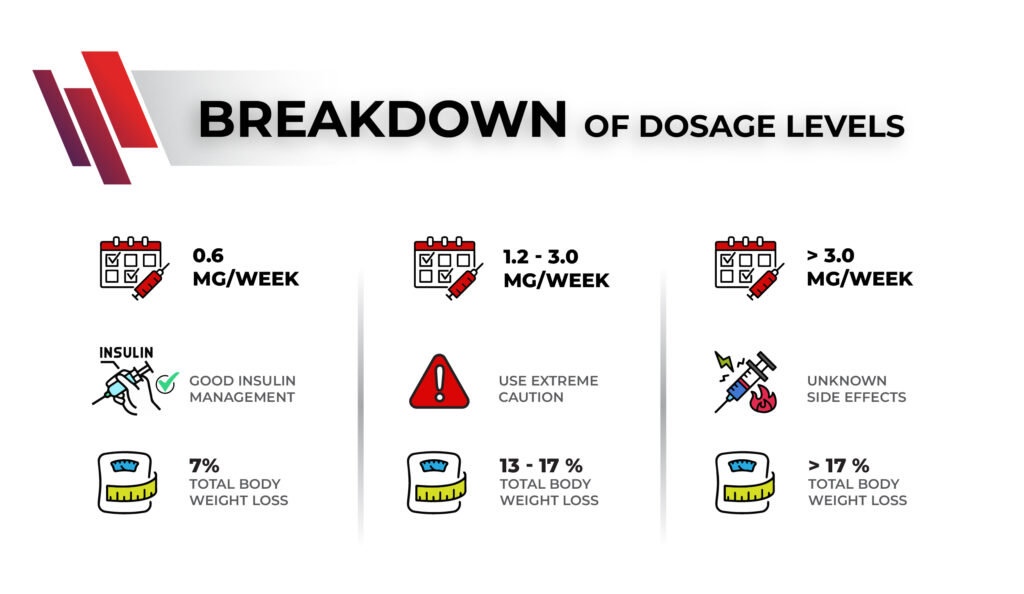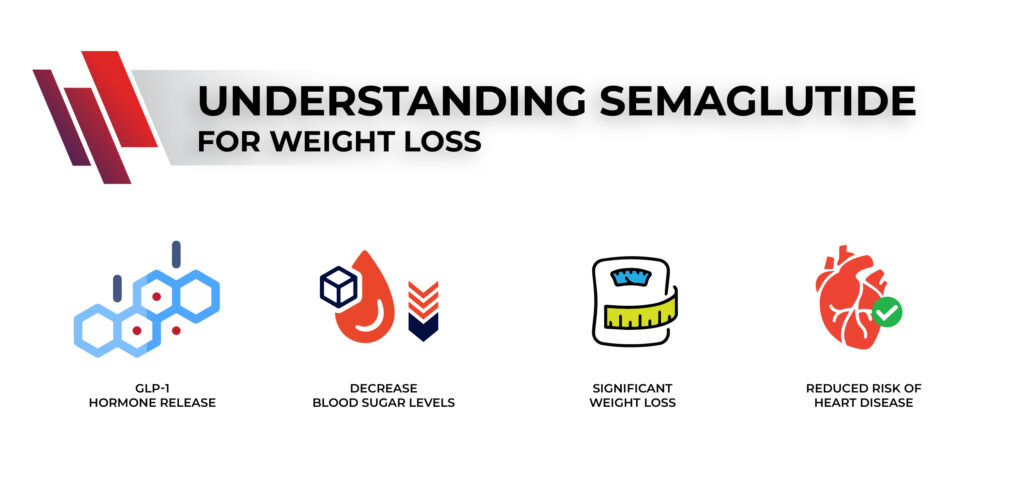
In the unyielding pursuit of a healthier way of life, the quest for an effective solution to shed excess weight remains an enduring challenge for millions.
With excess weight being linked to a host of health risks including elevated blood sugar, impaired renal function, and even a risk of diabetes, we should be doing anything we can to reduce excess weight.
A new treatment method called Semaglutide has shown to be effective, as the injections can help you feel fuller, improve insulin secretion, and reduce the risk of gaining weight. It will also help you lose weight.
So, what can you expect to lose when considering Semaglutide? Well, let’s look at a Semaglutide Weight Loss Dosage chart, shall we?
Key Takeaways
- The Semaglutide Weight Loss Dosage Chart provides estimates for weight loss over 25 weeks, emphasizing that these are based on current research and lifestyle adherence.
- The article highlights the controversy surrounding Semaglutide dosage, pointing out that the FDA-recommended doses for glycemic control may not align with those used for weight loss, making it challenging to predict weight loss solely based on dosing.
- The FDA-recommended dosing schedule for Semaglutide is presented, along with cautionary notes about adjusting doses based on individual responses.
- The article emphasizes the importance of lifestyle changes, cautioning against relying solely on Semaglutide for weight loss.
- The article explains how Semaglutide works as a GLP-1 RA, imitating the GLP-1 hormone to induce weight loss. It also provides guidance on what to do if a dose is missed.
Semaglutide Weight Loss Dosage Chart
Before looking at the chart, realize that these are purely estimates based on the current research available.
Your ability to adhere to a healthy lifestyle will grant you more of the desired results.
https://docs.google.com/spreadsheets/d/1UGfjLZxtMbik4qfeOH0DUYyzl5TWH4gRQUuZukZGjn0/edit?usp=sharing
This is an estimation of weight loss when combined with resistance training and the appropriate nutrition plan across 25 weeks.
The Standard Semaglutide Dosage Chart
As you can see from the chart above, there seems to be a direct link between weight loss and change in body weight .
This has been extensively studied in humans, and Semaglutide has actually been used in various areas of the weight loss journey.
We can already see that Semaglutde is being used as a treatment for obesity in peptide clinics and other medical facilities.
The big question we all have is what the dosage is going to look like?
Semaglutide dosage is a hotly contested topic, seeing as the studies done on Semaglutide are not even in line with the dosing schedule proposed by the FDA:
- Start at 0.25 mg once weekly. After 4 weeks, increase the dose to 0.5 mg once weekly.
- If after at least 4 weeks additional glycemic control is needed, increase to 1 mg once weekly (2.1).
- Administer once weekly at any time of day, with or without meals (2.1).
- If a dose is missed administer within 5 days of missed dose (2.1).
- Inject subcutaneously in the abdomen, thigh, or upper arm (2.2).
Why is this hotly contested? Well, these doses are given to those looking to manage insulin levels, not losing weight.
Chronic weight management is, of course, a benefit of Semaglutide, however, this needs to be controlled by a medical professional seeing as the medication has other effects one needs to take into account.
Thus, it is extremely hard to guess how much weight loss someone would experience based on their dosing alone.
Actually, with variables such as diet and exercise playing the biggest roles, it’s almost impossible to estimate weight loss.
That said, if you train hard, diet hard, and make other lifestyle changes, you can lose quite a bit of weight.
If you would like a greater breakdown of dosing instructions by the FDA, have a look below:
- Start OZEMPIC with a 0.25 mg subcutaneous injection once weekly for 4 weeks. The 0.25 mg dosage is intended for treatment initiation and is not effective for glycemic control.
- After 4 weeks on the 0.25 mg dosage, increase the dosage to 0.5 mg once weekly.
- If additional glycemic control is needed after at least 4 weeks on the 0.5 mg dosage, the dosage may be increased to 1 mg once weekly.
- If additional glycemic control is needed after at least 4 weeks on the 1 mg dosage, the dosage may be increased to 2 mg once weekly. The maximum recommended dosage is 2 mg once weekly.
- Administer OZEMPIC once weekly, on the same day each week, at any time of the day, with or without meals.
Breakdown of Semaglutide Dosage Levels and their Effects

| Dosage Level | Effects | Precautions | Weight Loss Potential |
| 0.6mg/week | Slightly above 0.5mg dose. | Effective insulin management.
Potential 7% weight loss in 12 weeks. |
Up to 7% in 12 weeks. |
| 1.2 – 3.0mg/week | Within the FDA-recommended range at a lower dose. | Caution advised for 2 – 3mg range.
Delaying dose escalation may have benefits. |
13 – 17% in 12 weeks with diet and exercise. |
| >3mg/week | No studies at these doses. | Unknown side effects.
Potentially dangerous. |
Estimated >17%, but highly uncertain. |
Again, the graph is merely a representation of what could be and is not set in stone.
0.6mg/week:
This is ever so slightly above the 0.5 mg dose that is mentioned in step two above.
You should expect to see some pretty good insulin management at this dose, and when combined with an exceptional diet and exercise plan, you should be able to lose 7% of your total body weight across 12 weeks.
1.2 – 3.0mg/week:
At the lower dose, this is still well within the ranges mentioned by the FDA, but the 2 – 3mg range is outside of what is mentioned by the FDA.
You should practice extreme caution when using such a dose. There are also a lot of positives to delaying dose escalation and getting all the progress possible from a lower dose.
You can expect to lose 13 – 17% of total body weight across 12 weeks when combined with an effective diet and training routine
>3mg/week:
At this point, everything is pure estimate. No studies are looking at these doses, and the dose escalation might even have side effects unknown to current knowledge.
This is dangerous. We can estimate you might lose >17% of total body weight per week, but again, it is purely estimation, and the medication guide gives little to no actual information on what would happen.
Adjustments based on individual responses
For this, we will refer back to the recommendations of the FDA to ensure we are covering all the bases.
- “The most common adverse reactions, reported in ≥5% of patients treated with OZEMPIC are nausea, vomiting, diarrhea, abdominal pain, and constipation”.
If this is present, you need to stop using the medication immediately and see a doctor. These seem to be the most common side effects experienced by users, but better safe than sorry.
When it comes to managing your dosages, there is no real guideline to follow, since this product is administered by a doctor who has to make the call off their heart.
That said, you should be considering your blood sugar levels to make sure you are healthy.
Even at a low dose, you need to check your levels. A healthcare professional would be more than happy to do this, however, resting blood sugar levels can be done at home.
Patients taking Semaglutide experience a drop in resting blood glucose levels, which is healthy, but having these levels drop too far can be dangerous.
Practical Tips for Following the Semaglutide Dosage Chart
No magic pill:
Taking Semaglutide or taking Ozempic should not be the saving grace. It is the cherry on top, the icing on the cake.
Physical activity, a good diet, and lifestyle changes are what are going to be what make the biggest change.
You should be doing everything you can to lose weight, seeing as there are emerging studies showing that if you simply rely on Semaglutide-induced weight loss you end up gaining it all back
Undeserved escalation of dosage:
Weight loss stopped? Surely you MUST increase the dose. Or, maybe you need to do some cardio. Maybe eat less.
Weight management isn’t a drug-filled endeavor, do not treat it as such.
Semaglutide treatment works, but this is not Semaglutide therapy that’ll fix all your problems. Put in the miles.
Watch out for Semaglutide side effects:
As with all drugs, there are side effects you need to be aware of.
Your healthcare provider should discuss all of these with you before you use the medication, especially if you are using other medications.
Side effects include: nausea, vomiting, and stomach pain
Understanding Semaglutide for Weight Loss

Semaglutide falls within the category of medications referred to as glucagon-like peptide-1 receptor agonists, abbreviated as GLP-1 RAs.
It operates by imitating the actions of the GLP-1 hormone, naturally released in the gastrointestinal tract following meals.
Among the various functions of GLP-1, one notable role is to stimulate the body to increase insulin production, leading to a decrease in blood sugar levels (glucose).
Consequently, healthcare providers have been employing semaglutide for over 15 years as a treatment for Type 2 diabetes.
Beyond its impact on insulin and glucose, GLP-1, when present at elevated levels, also engages with areas of the brain responsible for suppressing appetite and signaling a sense of fullness.
When incorporated into a regimen alongside proper diet and exercise, semaglutide can induce significant weight loss.
This weight loss, in turn, contributes to a lowered risk of conditions such as cancer, diabetes, and heart disease, particularly in individuals classified as obese or overweight.
Semaglutide (GLP-1) for Sale
Semaglutide gets grouped with other Peptides but is more commonly known as a GLP-1 receptor agonist. It mimics the action of human incretin glucagon-like peptide-1 (GLP-1).
This is something that you would want when trying to lose weight, and this is why Semaglutide is being used as an anti-obesity medication (combined with a good diet and training plan). It is simply a method of glycemic control. [1,2]
When trying to lose weight or even trying to increase weight dramatically (bulking), glycemic control could help a tremendous amount.
Semaglutide will help your pancreas release the right amount of insulin when your blood sugar is high. So, it helps your body produce the correct amount of insulin needed.
This can help you avoid chronically high levels of blood sugar, which can have some severe impacts on your health. Fitness fanatics will also know that elevated blood sugar levels are one of the major causes of inflammation, fat gain, and heart disease.
Semaglutide Overview
 Top Benefits: Increases glycaemic control and decreases hunger
Top Benefits: Increases glycaemic control and decreases hunger Form: Injectable liquid
Form: Injectable liquid Max Time Used: 6 – 8 Weeks
Max Time Used: 6 – 8 Weeks Average Cost: $119.99
Average Cost: $119.99 Side Effects: Allergic reaction
Side Effects: Allergic reaction Dangers: Allergic reaction
Dangers: Allergic reaction Best Peptide Stack: HGH / IGF-1 / HGH-Frag
Best Peptide Stack: HGH / IGF-1 / HGH-Frag
⚤ Men/Women: Men and women Go to the Full review
Go to the Full review
- Increases insulin control
- Decreases hunger
- Pain at the injection site
- Allergic reaction
Missed Semaglutide Dose: What You Need to Know
Sticking to the dosing schedule is pretty important when it comes to Semaglutide – especially if your goal is to manage your blood sugar or blood glucose levels.
This is because Semaglutide works over time as a management tool, and not an acute method of solving a problem.
If you do end up missing a dose, you should do the following:
- If you miss a dose of Semaglutide, take the missed dose as soon as possible within 5 days after the missed dose.
- If more than 5 days have passed, skip the missed dose, and take your next dose on your regularly scheduled day.
Next Semaglutide Dose: Timing and Considerations
Again, we have to stick to the science of what has already been released by the FDA and the producers of these products:
Semaglutide For Type 2 Diabetes and Lowering the Risk of Heart Attack/Stroke:
For injection dosage form (Ozempic® solution):
Adults
At first, 0.25 milligrams (mg) injected under the skin once a week for 4 weeks. Your doctor may increase your dose as needed. However, the dose is usually not more than 2 mg once a week.
Children
Use and dose must be determined by your doctor.
Semaglutide For Weight Management:
For injection dosage form (Wegovy® solution):
Adults and children 12 years of age and older
At first, 0.25 milligrams (mg) injected under the skin once a week for 4 weeks. Your doctor may increase your dose every 4 weeks. However, the dose is usually not more than 2.4 mg once a week.
Children younger than 12 years of age
Use and dose must be determined by your doctor.
If you miss a dose of this medicine, take it as soon as possible. However, if it is almost time for your next dose, skip the missed dose and go back to your regular dosing schedule.
Do not double-dose.
Semaglutide Dose Escalation Schedule
Personal reactions might influence this schedule, and your scheduled dose might be vastly different from the dose escalation schedule.
Thus, use caution, and act like adults.
- First four weeks: 0.25mg/week
- Second four weeks: 0.5mg/week
- Third four weeks: 1.00mg/week
- Moving Forward: 1.7 mg/week (maintenance dose)
- Moving Forward: 2.4 mg/week (maintenance dose)
Maintaining Consistency with Semaglutide Weight Loss Dosage Chart
Establishing and adhering to a regularly scheduled day is of paramount importance, especially when incorporating medications such as Semaglutide into one’s daily routine.
The significance lies not only in optimizing the therapeutic effects of the medication but also in enhancing overall health outcomes.
The efficacy of Semaglutide is intricately linked to consistency in its administration.
Integrating this medication into a well-structured daily routine ensures that it is taken at the same time each day, allowing for a steady and predictable release of its therapeutic effects.
A scheduled approach aids in maintaining stable blood sugar levels throughout the day, preventing fluctuations that may contribute to diabetes-related complications.
Furthermore, Semaglutide’s interaction with the brain, particularly in suppressing appetite and inducing a sense of fullness, underscores the importance of a consistent schedule.
When taken regularly, especially in conjunction with a balanced diet and regular exercise, Semaglutide has shown remarkable effectiveness in promoting weight loss.
This is not only beneficial for individuals managing obesity or overweight conditions but also contributes to a reduced risk of associated health concerns, including cancer, diabetes, and heart disease.
Incorporating Semaglutide into a daily routine goes beyond mere adherence to a medication schedule; it becomes a strategic decision to maximize its therapeutic benefits.
Consistency fosters a more stable metabolic environment, supporting the medication’s role in managing glucose levels and insulin production.
This, in turn, translates to better long-term control of diabetes and a decreased risk of complications.
A regularly scheduled day, with Semaglutide as a central component, empowers individuals to take charge of their health proactively.
It transforms the management of Type 2 diabetes and associated conditions into a structured and deliberate effort, aligning with the broader goals of promoting overall well-being.
By embracing a consistent schedule, individuals can harness the full potential of Semaglutide, not only for diabetes management but also for achieving and sustaining a healthier lifestyle.
Conclusion
In conclusion, the Semaglutide Weight Loss Dosage Chart serves as a valuable guide, offering insights into potential weight loss outcomes across different dosage levels.
However, it’s crucial to note that these estimates are contingent on individual adherence to a healthy lifestyle.
The controversy surrounding Semaglutide dosage for weight management highlights the need for careful consideration by medical professionals.
Practical tips underscore the importance of viewing Semaglutide as a complement to lifestyle changes.
Understanding Semaglutide’s dual impact on insulin regulation and appetite suppression emphasizes the significance of a consistently maintained schedule for maximizing benefits.
In essence, a regularly scheduled day empowers individuals in their pursuit of overall well-being.
FAQs
How do I handle a missed dose?
If you do end up missing a dose, you should do the following:
- If you miss a dose of Semaglutide, take the missed dose as soon as possible within 5 days after the missed dose
- If more than 5 days have passed, skip the missed dose, and take your next dose on your regularly scheduled day
Can I adjust the dosage without consulting my healthcare provider?
No, never change the dose or timing without consulting with your healthcare provider.
What should I do if I experience side effects?
Inform your healthcare provider immediately. If they are unavailable, monitor the situation and reach out to the emergency room if needed.
Is it okay to take Semaglutide on an empty stomach?
The oral version, Rybelsus, needs to be taken on an empty stomach.
How long does it take to see results with the recommended dosage?
It really depends on how severe your starting position is, and how much you are doing to aid in chronic weight management. Diet and train more, well, you’re more likely to see faster results.

